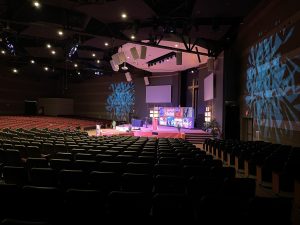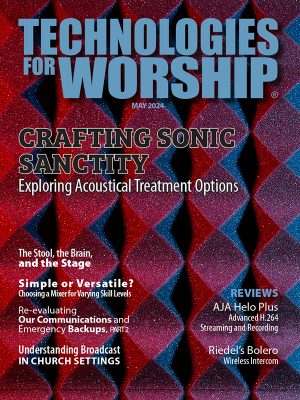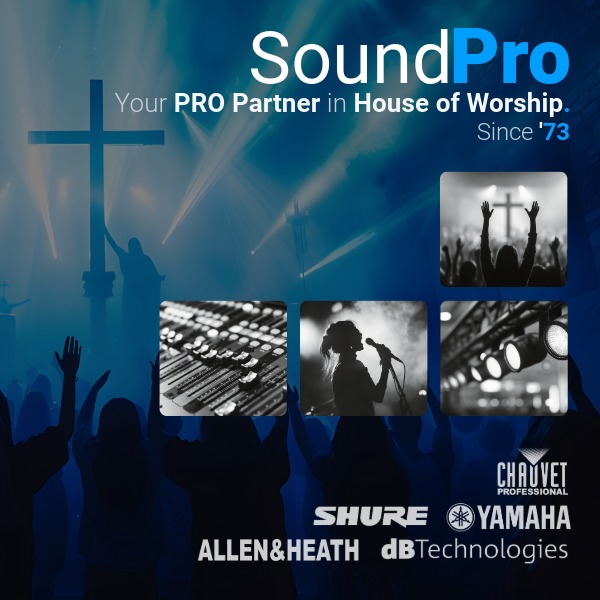 Like many churches in recent years, Living Hope Church in Willmar, Minnesota, made the decision to upgrade their stage and house lighting. Built in the 1990s, the worship facility was relying on its original incandescent lighting system to support services, with the result being a space that was neither bright nor energy efficient. Additionally, the facility’s old dimmers and non-dim modules and lighting console had been in service for long enough that it had begun to fail and was obsolete. The time had come to overhaul the lighting system, switching to LED fixtures and tearing out the dying control rack. The church tapped integration company FARBER ‘Venue Transformation’ to remaster their sanctuary lighting system with three goals in mind: create a lighting system that is brighter, more energy efficient, and very simple to power on and off.
Like many churches in recent years, Living Hope Church in Willmar, Minnesota, made the decision to upgrade their stage and house lighting. Built in the 1990s, the worship facility was relying on its original incandescent lighting system to support services, with the result being a space that was neither bright nor energy efficient. Additionally, the facility’s old dimmers and non-dim modules and lighting console had been in service for long enough that it had begun to fail and was obsolete. The time had come to overhaul the lighting system, switching to LED fixtures and tearing out the dying control rack. The church tapped integration company FARBER ‘Venue Transformation’ to remaster their sanctuary lighting system with three goals in mind: create a lighting system that is brighter, more energy efficient, and very simple to power on and off.
“Around 30 percent of the lighting wasn’t working, and the church had to actually leave the board on 24/7, so that it would be booted up properly to run,” said Charles Craun, FARBER’s Lighting and Production Designer. “It was complicated to program, so they didn’t program extensively on it. Instead, they would bring in other consoles for big services and their yearly conference.”
Upgrading to LED fixtures would certainly brighten the sanctuary, but when it comes to maximizing the energy efficiency, minimizing utility costs, and delivering reliable control, finding the right power control and distribution solution is vital. To reap the benefits LED lighting provides, fixtures must be completely powered down — not left in standby mode or dimmed to zero. That’s because power is still flowing, and where there’s power, there’s heat. Heat can rack up HVAC costs and shorten the life of the equipment. To ensure that life of their new system with simple power control, the company selected LynTec.
Shining a Light on a Solution
For years installers and lighting designers like FARBER have relied on LynTec’s flagship RPC breaker and RPCR relay panels. LynTec intelligent panels do so much more than provide power control to AV systems, including setup, sequencing, and zone control. Because LynTec solutions support DMX and sACN within the same panels, FARBER was able to deliver a cost-efficient, reliable, and comprehensive power control system with the LCP Series Lighting Control Panel. Whether it’s powering down LED house and stage lighting or sequencing on and off video components, the LCP solution just works.
Introduced in 2021 and designed exclusively for lighting and video wall installations, the LCP Series is built on the same internationally recognized Square D G3 Powerlink™ controllable circuit breaker platform as the patented RPC Power Control Series, but with the lighting control features these projects require, including the increased installation flexibility. The LCP controller electronics have been removed from the panel and mounted in a standalone, 12×12 enclosure. This increases installation flexibility and reduces wall space requirements. Second, the power supply has been moved into the primary panel enclosure, thereby eliminating the need for sidecars. As a result, the maximum width of a standard NEMA 1 enclosure is 20 inches.
An Illuminated Design
With the LCP, FARBER’s Design Engineer – Cory Deming, was able to propose an electrical and control design that was flexible and cost-effective, transforming Living Hope’s lighting experience dramatically. The stage lighting package specified by Craun included 16 Chauveti Ovation P-56VW LED PAR fixtures, a Chauvet Ovation E-910 FC LED ellipsoidal, Chauvet Ovation 25-50deg zoom with a custom template, two Chauvet Ovation Rêve R-3 LED multicolor ellipsoidals, Chauvet Ovation 26-degree lens, along with custom cross gobo and holder. The LED moving light design was comprised of four Maverick Silens2 profiles, two Rogue R2X VW washes and three Rogue R2X washes, all from Chauvet. While a Chamsys QuickQ-30 lighting controller takes care of event lighting, a Q-Rack handles house light control and entry stations as well as preset stage looks. Networked with a pair of Chauvet’s NET-X II ethernet-to-DMX nodes and a Netgear M4250 series switch, these are connected to an ETC Unison DRd series conventional dimmer, with the LynTec LCP panel being driven via DMX.
For house lighting, FARBER installed 26 Environmental Lights REVI downlights and REVI XL1 light engines with 16 REVI Drive XL 4-Channel DMX-controlled power supplies. There are also 35 Environmental Lights 6-inch round lensed sloped ceiling/wall washes with REVI XL1 engines. Motorized circuits replace circuits previously connected to the conventional dimming system. Some of the non-motorized circuits are connected to the REVI Drive house light power supplies, and some are for future expansion. The UBR panel also supplies power to the ETC DRd dimmers. This hybrid system combines LED and conventional fixtures/dimming with DMX and ArtNet control. With their large inventory of conventional fixtures, the church was not ready to switch to a 100% LED lighting system. The new arrangement allows them to make that transition at their own pace.
“The expanded capabilities that LynTec offers allows Living Hope to be able to use their own system rather than having to bring in other equipment during events,” said Deming. “It also gave them a lot more control. For example, they’re able to program presets into the entry panel locations. They can fire the dimmers up and down or do the same with the moving lights as needed. It works seamlessly and easily. If you don’t want your moving lights running 24/7 — which you don’t — the volunteer crew can just have the LynTec panel shut those off. This saves energy to cool the space, power to have the fixtures in standby, maintenance by not sucking in dust unnecessarily – all of which significantly increases the life of their fixtures. It’s a great match.”
Indeed, the lighting experience at Living Hope is much more positive from operations and energy perspective — and brighter.
“Now parishioners can read everything. In fact, it’s so bright, the church only runs the house lighting system at 80% now,” said Craun.




